|
|
|
Sort Order |
|
|
|
Items / Page
|
|
|
|
|
|
|
| Srl | Item |
| 1 |
ID:
181733
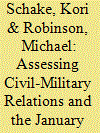

|
|
|
|
|
| Summary/Abstract |
The events of January 6, 2021, when violent rioters attacked the Capitol building in Washington in order to disrupt validation of the 2020 presidential election, forced an unprecedented reckoning with the state of American politics. Members of Congress struggled to account for the rhetoric that gave rise to the event; law enforcement grappled with the challenge of holding accountable those who perpetrated the violence; and journalistic outlets wrestled with reporting a complex web of conspiracy theories and disinformation that gave rise to the insurrection. But for senior military leaders, the question was how to explain the troubling presence of active duty servicemembers and veterans in the first attack on the American seat of government in two centuries. The result is a profound and urgent discussion in U.S. civil-military relations.
|
|
|
|
|
|
|
|
|
|
|
|
|
|
|
|
| 2 |
ID:
166156
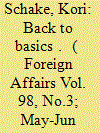

|
|
|
| 3 |
ID:
065597


|
|
|
| 4 |
ID:
089718
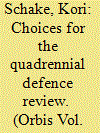

|
|
|
| 5 |
ID:
161756


|
|
|
|
|
| Summary/Abstract |
In considering Grover Cleveland’s life and thought, the author contends that this Democratic president was profoundly conservative. In fact, he meets the criteria for “conservative internationalism,” as defined by Henry Nau. Cleveland was an advocate of solid currency, the government not spending more than it takes in, big business not “railroading” the little guy. And, he fought impediments to free trade, domestically and internationally. Finally, while cautious about American commitments abroad, Grover Cleveland defended an assertive U.S. policy throughout the Western Hemisphere.
|
|
|
|
|
|
|
|
|
|
|
|
|
|
|
|
| 6 |
ID:
110156
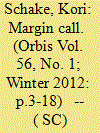

|
|
|
|
|
| Publication |
2012.
|
| Summary/Abstract |
America's military has proven incredibly effective and adaptive to the threats of the 9/11 era. It has not, however, been particularly cost-conscious. Insolvency is our gravest national security threat, and - thankfully - the Congress has finally gotten serious about dealing with it. Defense is in for a decade of austerity, of a magnitude that cannot be accommodated within current strategy and forces. Much higher risk will need to be accepted in how we fight our wars and address threats of lesser magnitude or longer lead times unless we find more innovative approaches. Foregoing counterinsurgencies, simplifying our war aims, protecting our advantages in creativity, restructuring military benefits, shifting greater responsibility to allies and emphasizing cost-exchange ratios in our operations will be necessary. It is a daunting list, and wearying to a military that has shouldered the burdens of wars for a decade with little contribution from our broader society. But it, or something like it, will also be necessary to redress the dangerous vulnerability or our debt.
Historian Arnold Toyenbee said that empires die by suicide, not homicide. Our country has been on a path to suicide by spending profligacy and it has resulted in a debt problem of enormous magnitude. This is our main strategic vulnerability, and our capacity to solve it will likely be the crucial test of whether American hegemony is perpetuated through the twenty-first century, or we have begun to decline.
Our country is facing a margin call. We have used borrowed money to purchase assets. Those assets are both discretionary (defense and other annual spending) and non-discretionary (entitlement payments and promises). External markets and internal regulators-in the form of the American electorate-have called into question whether we have the money to pay for the assets we have purchased. Receiving a margin call, the investor must either increase the amount of money on deposit or sell off assets.
Faced with difficult choices, the United States has two enormous advantages. First, Americans have acknowledged the problem and are engaged in an extended and boisterous debate on how to solve it. Second, U.S. military dominance is so substantial that we can absorb near-term risk of significant defense spending cuts in order to solve the larger strategic problem of our national indebtedness.
The coming cuts in defense will necessitate the first serious reconsideration in the 9/11 era of the strategy and requirements for U.S. military forces. The Department of Defense (DOD) is in the process of determining where to pare for the $450 billion in cuts that constitute the first phase of the budget reductions; the more vexing question is how DOD would accommodate the additional $600-800 billion that would come with sequestration or a second phase "super committee" agreement.
To operate within the constraints of such austerity, we will have to fight differently. The size of our forces will shrink further, even though they are already too small. We will not be able to sustain personnel-intensive wars like counterinsurgencies. The operational approaches available at lesser cost have daunting endogenous effects on our military and exogenous effects on the societies in territories where we will apply military force. We will become more reliant on reconstitution, extending the timelines beyond what we have come to take for granted as immediate availability of forces and rapid execution of war plans.
We may also need to forego important recalibrations, like allowing the Marine Corps to differentiate itself from the Army and refocus on amphibious operations, and the long overdue returning of the national guard and reserve to their traditional roles. Spending in other national security agencies-on which current war strategies rely-is almost certain to be reduced even more than in DOD, calling into question our ability to conduct "whole of government" operations. These developments w
|
|
|
|
|
|
|
|
|
|
|
|
|
|
|
|
| 7 |
ID:
173654


|
|
|
|
|
| Summary/Abstract |
The US military’s rebuke of Donald Trump’s attempt to militarise domestic law enforcement was perhaps the most important episode in US civil–military relations since Harry Truman fired Douglas MacArthur in 1951.
|
|
|
|
|
|
|
|
|
|
|
|
|
|
|
|
| 8 |
ID:
155248


|
|
|
|
|
| Summary/Abstract |
The most important national security challenge for the next president will be rebuilding a domestic consensus on America’s role in the world. Unless the president can answer fundamental questions voters are asking, she or he will be hobbled in foreign policy. Only having done that can our next president proceed to adopt policies and develop strategies that manage a rising China and a declining Russia, organize countries with common interests to stanch the wildfires burning in the Middle East, and reclaim for our country the international stature that fosters our security and prosperity.
|
|
|
|
|
|
|
|
|
|
|
|
|
|
|
|
| 9 |
ID:
162730


|
|
|
|
|
| Summary/Abstract |
The Restless Wave, the late Senator John McCain’s final book, is not only a swansong, but also a substantive political accounting and a call to duty.
|
|
|
|
|
|
|
|
|
|
|
|
|
|
|
|
| 10 |
ID:
147506


|
|
|
|
|
| Summary/Abstract |
From abroad, it must look as though America has lost its collective mind. For those who rely on the United States’ protection, it must unsettle to be reminded how wide open the American political system truly is. For those who care about effective governance, it might mystify that 13 million Republicans cast their ballots in favour of an erratic novice instead of a dozen or so experienced governors and congressmen. For those doubtful of America’s decency, Republican nominee Donald Trump’s behaviour and the belligerence of many of his supporters must be an affirmation. Republicans are seemingly in thrall to a candidate who repudiates both their principles and their policies.
|
|
|
|
|
|
|
|
|
|
|
|
|
|
|
|
| 11 |
ID:
176055


|
|
|
|
|
| Summary/Abstract |
Despite the dangers Donald Trump posed to constitutional rule and political norms, he may turn out to have been good for democracy in America.
|
|
|
|
|
|
|
|
|
|
|
|
|
|
|
|
| 12 |
ID:
132551
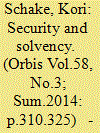

|
|
|
|
|
| Publication |
2014.
|
| Summary/Abstract |
The American defense establishment has come to think of itself as the victim of complex and demanding threats, political irresponsibility and public apathy. While true, such conditions are often the case in American history. "Don't fight the problem" is a standard instruction in war games. The Department of Defense should adopt that approach with its budget and strategy: stop submitting budgets in excess of legislated limits and devise a strategy consistent with them. It should explore alternative ways to achieve policy objectives, develop a concrete means of assessing risk, and on that basis build greater support for its preferred strategy.
|
|
|
|
|
|
|
|
|
|
|
|
|
|
|
|
| 13 |
ID:
047284


|
|
|
|
|
| Publication |
Washington,D.C, Institute for ational Strategic StudiesN, 2001.
|
| Description |
xi, 79p.
|
| Contents |
McNair paper 64
|
|
|
|
|
|
|
|
|
|
|
|
Copies: C:1/I:0,R:0,Q:0
Circulation
| Accession# | Call# | Current Location | Status | Policy | Location |
| 044953 | 355.8251190955/SCH 044953 | Main | On Shelf | General | |
|
|
|
|
| 14 |
ID:
155280


|
|
|
|
|
| Summary/Abstract |
What causes war? Thucydides thinks fear, honor, and interest—those fundamental human motivations that persuade us beyond caution—cause wars. Clausewitz tries to leach those passions out of the process and distill a calculus of political aims as the cause of war. Geoffrey Blainey has a simpler discriminator: states choose war when they think they will win. Barbara Tuchman has the simplest explanation of all: human folly. Azar Gat believes scarcity drives warfare, and, therefore, prosperity is making it obsolete. The author analyzes the contributions of these five writers in addressing this perennial question about war.
|
|
|
|
|
|
|
|
|
|
|
|
|
|
|
|
| 15 |
ID:
149631


|
|
|
|
|
| Summary/Abstract |
Should the United States commit its unrivaled power to spreading democracy and cementing Washington’s leadership of the liberal international order that has provided decades of stability and security but has come under increasing strain in recent years? Or would U.S. interests be better served by less American intervention in world affairs—and, in particular, by less exertion of U.S. military force? Theorists and policymakers have argued over those questions for decades, especially since the end of the Cold War. During the past eight years, the Obama administration has changed the terms of the debate by pursuing a strategy of retrenchment.
|
|
|
|
|
|
|
|
|
|
|
|
|
|
|
|
|
|
|
|
|